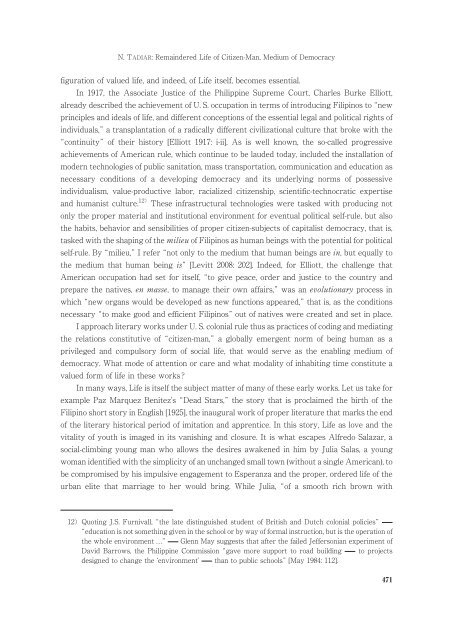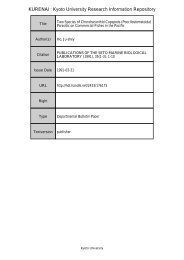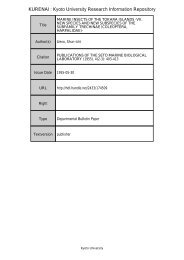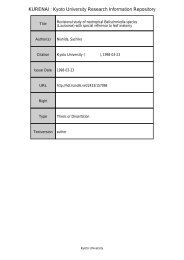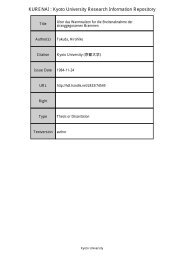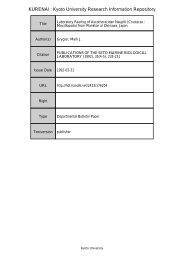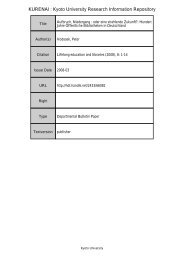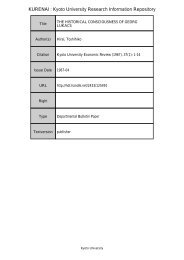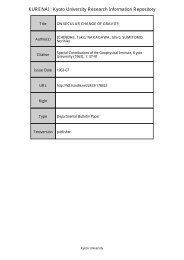Remaindered Life of Citizen-Man, Medium of Democracy
Remaindered Life of Citizen-Man, Medium of Democracy
Remaindered Life of Citizen-Man, Medium of Democracy
Create successful ePaper yourself
Turn your PDF publications into a flip-book with our unique Google optimized e-Paper software.
N. TADIAR: <strong>Remaindered</strong> <strong>Life</strong> <strong>of</strong> <strong>Citizen</strong>-<strong>Man</strong>, <strong>Medium</strong> <strong>of</strong> <strong>Democracy</strong><br />
figuration <strong>of</strong> valued life, and indeed, <strong>of</strong> <strong>Life</strong> itself, becomes essential.<br />
In 1917, the Associate Justice <strong>of</strong> the Philippine Supreme Court, Charles Burke Elliott,<br />
already described the achievement <strong>of</strong> U. S. occupation in terms <strong>of</strong> introducing Filipinos to “new<br />
principles and ideals <strong>of</strong> life, and different conceptions <strong>of</strong> the essential legal and political rights <strong>of</strong><br />
individuals,” a transplantation <strong>of</strong> a radically different civilizational culture that broke with the<br />
“continuity” <strong>of</strong> their history [Elliott 1917: i-ii]. As is well known, the so-called progressive<br />
achievements <strong>of</strong> American rule, which continue to be lauded today, included the installation <strong>of</strong><br />
modern technologies <strong>of</strong> public sanitation, mass transportation, communication and education as<br />
necessary conditions <strong>of</strong> a developing democracy and its underlying norms <strong>of</strong> possessive<br />
individualism, value-productive labor, racialized citizenship, scientific-technocratic expertise<br />
and humanist culture. 12) These infrastructural technologies were tasked with producing not<br />
only the proper material and institutional environment for eventual political self-rule, but also<br />
the habits, behavior and sensibilities <strong>of</strong> proper citizen-subjects <strong>of</strong> capitalist democracy, that is,<br />
tasked with the shaping <strong>of</strong> the milieu <strong>of</strong> Filipinos as human beings with the potential for political<br />
self-rule. By “milieu,” I refer “not only to the medium that human beings are in, but equally to<br />
the medium that human being is” [Levitt 2008: 202]. Indeed, for Elliott, the challenge that<br />
American occupation had set for itself, “to give peace, order and justice to the country and<br />
prepare the natives, en masse, to manage their own affairs,” was an evolutionary process in<br />
which “new organs would be developed as new functions appeared,” that is, as the conditions<br />
necessary “to make good and efficient Filipinos” out <strong>of</strong> natives were created and set in place.<br />
I approach literary works under U. S. colonial rule thus as practices <strong>of</strong> coding and mediating<br />
the relations constitutive <strong>of</strong> “citizen-man,” a globally emergent norm <strong>of</strong> being human as a<br />
privileged and compulsory form <strong>of</strong> social life, that would serve as the enabling medium <strong>of</strong><br />
democracy. What mode <strong>of</strong> attention or care and what modality <strong>of</strong> inhabiting time constitute a<br />
valued form <strong>of</strong> life in these works?<br />
In many ways, <strong>Life</strong> is itself the subject matter <strong>of</strong> many <strong>of</strong> these early works. Let us take for<br />
example Paz Marquez Benitezʼs “Dead Stars,” the story that is proclaimed the birth <strong>of</strong> the<br />
Filipino short story in English [1925], the inaugural work <strong>of</strong> proper literature that marks the end<br />
<strong>of</strong> the literary historical period <strong>of</strong> imitation and apprentice. In this story, <strong>Life</strong> as love and the<br />
vitality <strong>of</strong> youth is imaged in its vanishing and closure. It is what escapes Alfredo Salazar, a<br />
social-climbing young man who allows the desires awakened in him by Julia Salas, a young<br />
woman identified with the simplicity <strong>of</strong> an unchanged small town (without a single American), to<br />
be compromised by his impulsive engagement to Esperanza and the proper, ordered life <strong>of</strong> the<br />
urban elite that marriage to her would bring. While Julia, “<strong>of</strong> a smooth rich brown with<br />
12) Quoting J.S. Furnivall, “the late distinguished student <strong>of</strong> British and Dutch colonial policies”<br />
“education is not something given in the school or by way <strong>of</strong> formal instruction, but is the operation <strong>of</strong><br />
the whole environment . . .” Glenn May suggests that after the failed Jeffersonian experiment <strong>of</strong><br />
David Barrows, the Philippine Commission “gave more support to road building to projects<br />
designed to change the ʻenvironmentʼ than to public schools” [May 1984: 112].<br />
471


